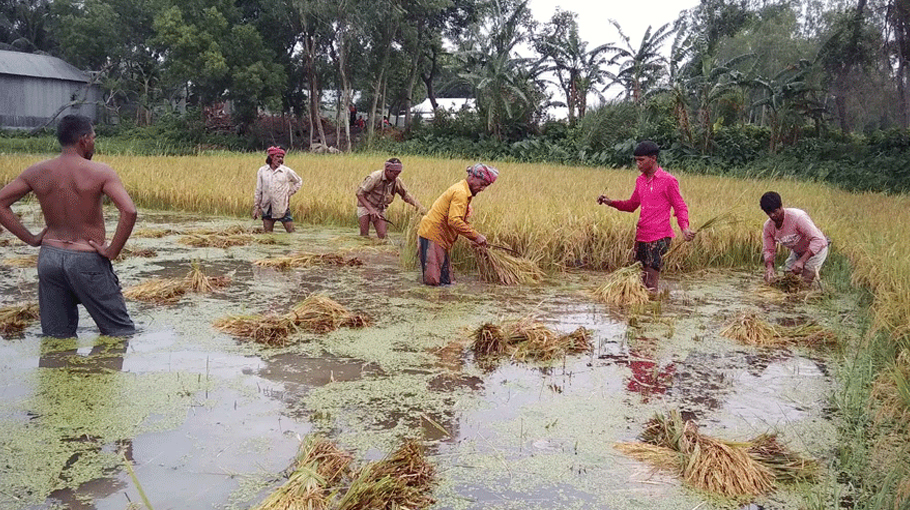Flash floods, heavy rain cause huge damage to crops

Amid the current flash floods which already damaged huge crops, the recent cyclone Asani caused severe damage to majorities of the Boro paddy across the country. Due to two consecutive natural calamities, many farmers have lost their harvest.
Such a situation has also raised concerns about meeting the government’s target for paddy and rice procurement.
A former research director and economist at the Bangladesh Institute of Development Studies (BIDS) M Asaduzzaman, said, “About 10 percent of boro paddy comes from natural wetlands or haors. Since boro accounts for 60 percent of our rice production, the flash flood in haor could have a significant impact. The latest heavy rains have also caused major damage. As a result, there is uncertainty in boro production.”
However, the government is not worried about this. Officials at the Ministry of Food and Agriculture said that the amount of paddy damaged is just around one percent of the total crop. Even after that, they will consider the decision of import considering the situation of internal collection.
Experts said the government needs to think about rice stock. Otherwise, the rice market may become uncontrollable in the coming days again.
According to the Ministry of Agriculture, heavy rains and landslides have damaged 9,700 hectares of boro paddy in seven districts of Haor.
However, according to local farmers and organizations involved in the haor crop protection movement, 20,000 hectares of land in 31 haors in Sunamganj alone have been already submerged this season. For this 1,20,000 tonnes of paddy were completely lost which present market value is around Tk 300 crore.
Read More: Boro paddy cultivation starts in Gaibandha
According to the Department of Agricultural Extension (DAE), the target for boro cultivation this year was 48.72 lakh hectares. In contrast, boro has been planted in 49.63 lakh hectares of land. In the fiscal year 2020-21, the target was set to produce about 2.875 crore tonnes of rice in the country through boro cultivation.
However, the DAE could not provide final information on the total damage caused by the rains and floods.
Ashuganj Auto Rice Mill Owners’ Association general secretary Ziaul Karim Khan Saju said that due to being immature and pungent paddy we are getting less rice from those paddies. A crisis has been created due to the non-availability of quality paddy. If this crisis continues, the price of rice will increase likely.
According to the Food Ministry, 10.26 lakh tonnes of rice were stored till April 11. From July 2021 to May this year, 982 tonnes of rice have been imported by the government and private sector. Even after this, the price of rice has not come down.
According to government estimates, the price of fine rice has risen by more than 4 percent (Tk 5) per kg in the last one year.
The government has started buying paddy directly from farmers at Tk 27 per kg from April 28 and rice at Tk 40 per kg from May 7. The procurement will continue till August 31. Till May 11, 290 tonnes of boro paddy and 962 tons of rice have been collected from internal sources.
However, due to natural calamities and higher market prices of paddy than the price fixed by the government, farmers in different areas are selling paddy to local markets and traders instead of government warehouses. As a result, there are doubts about meeting the target of paddy and rice procurement this season.




